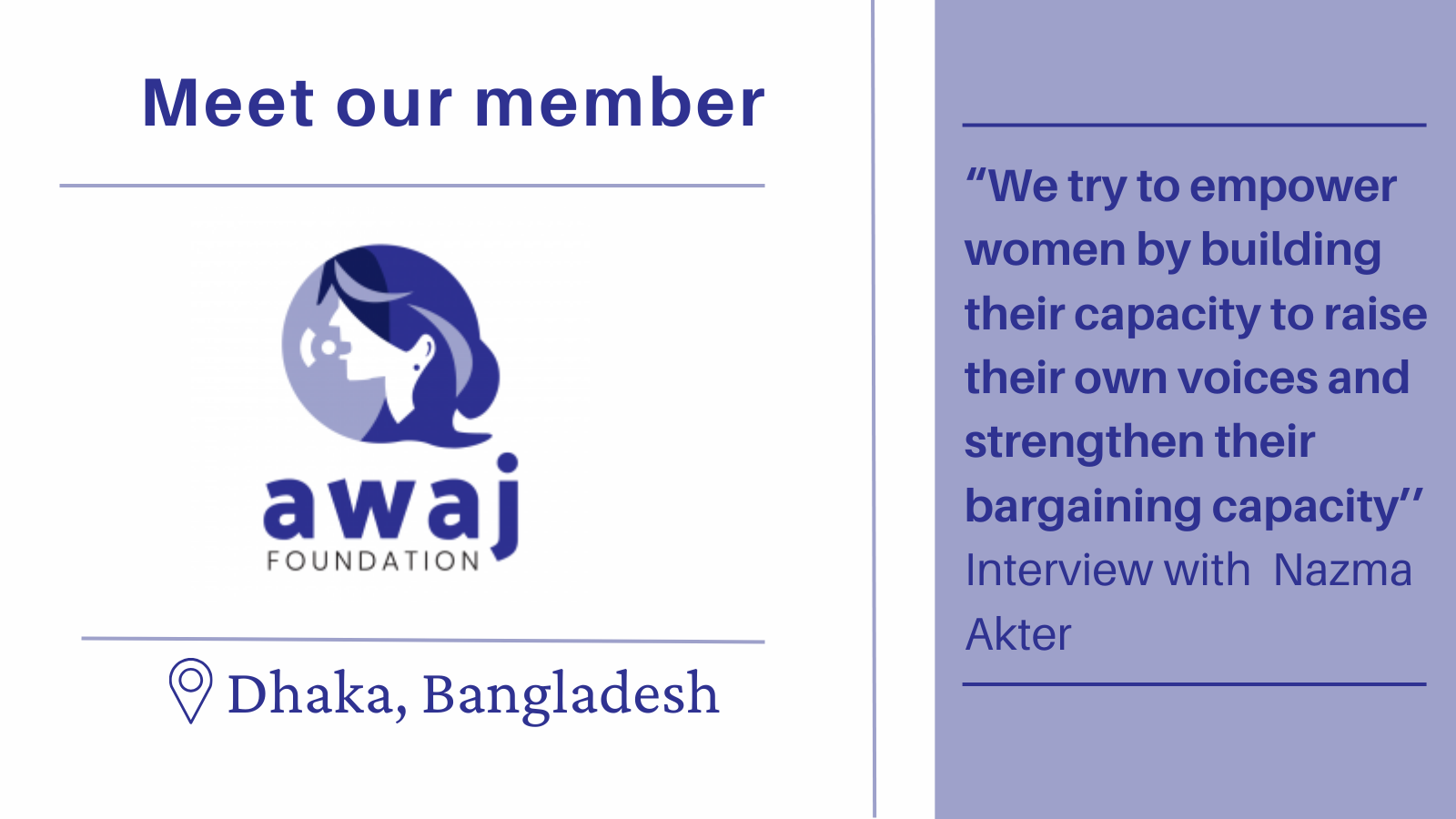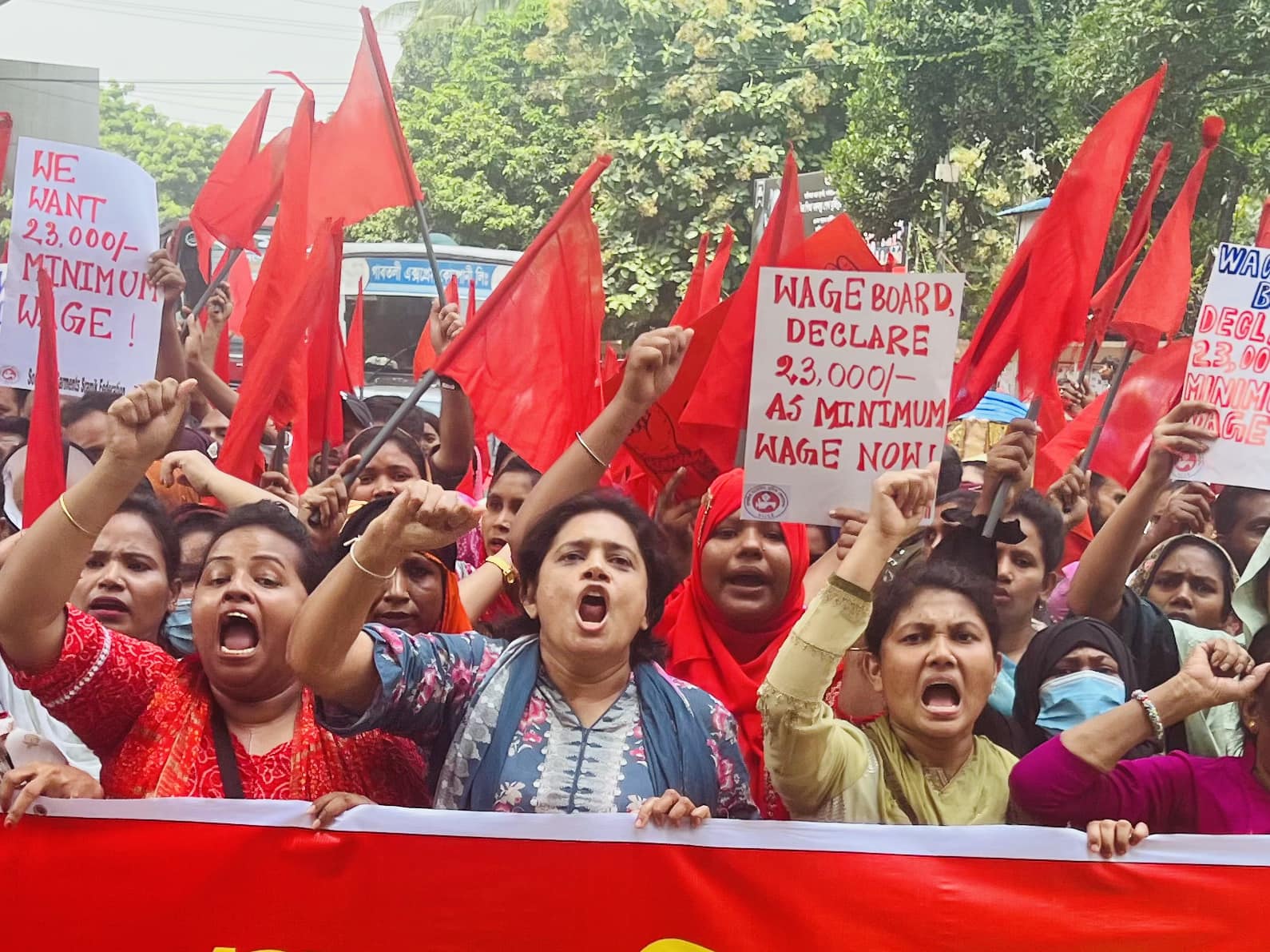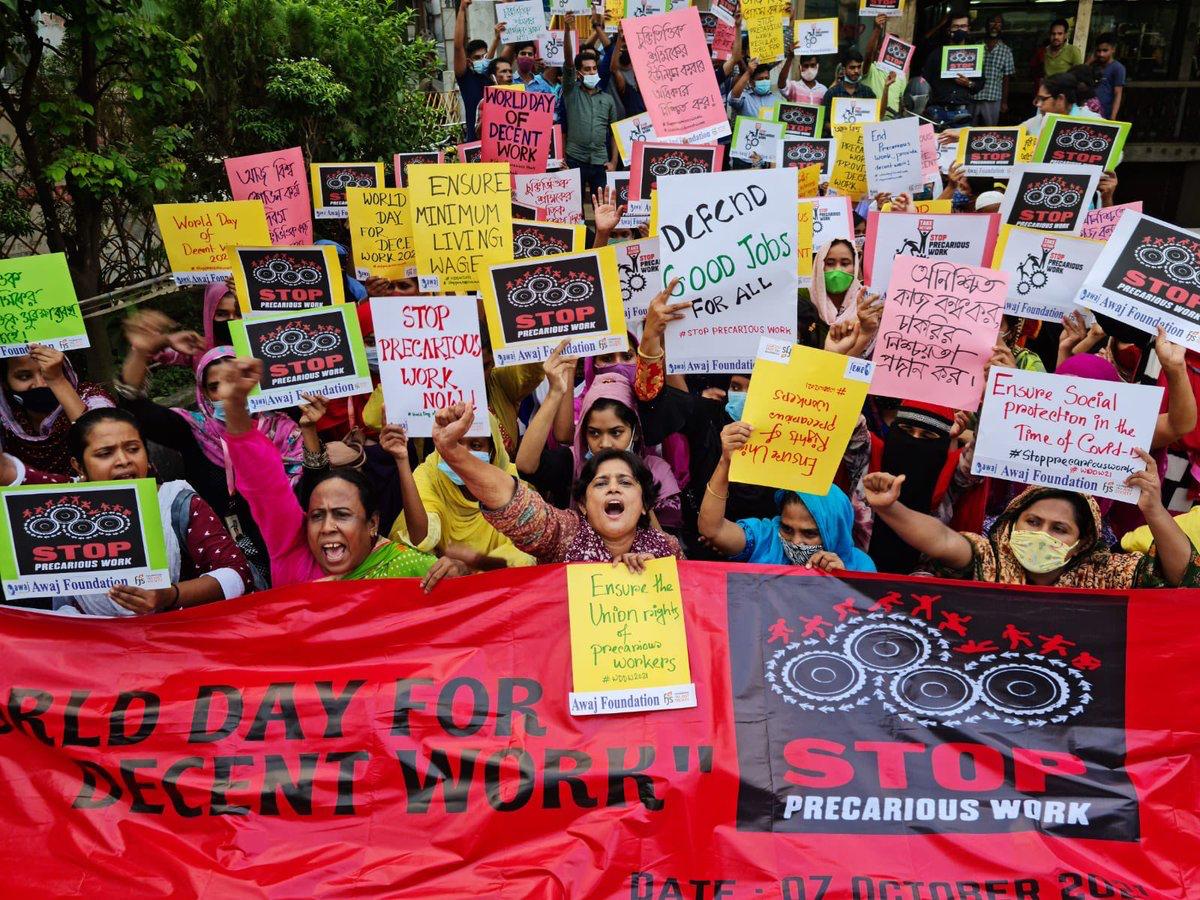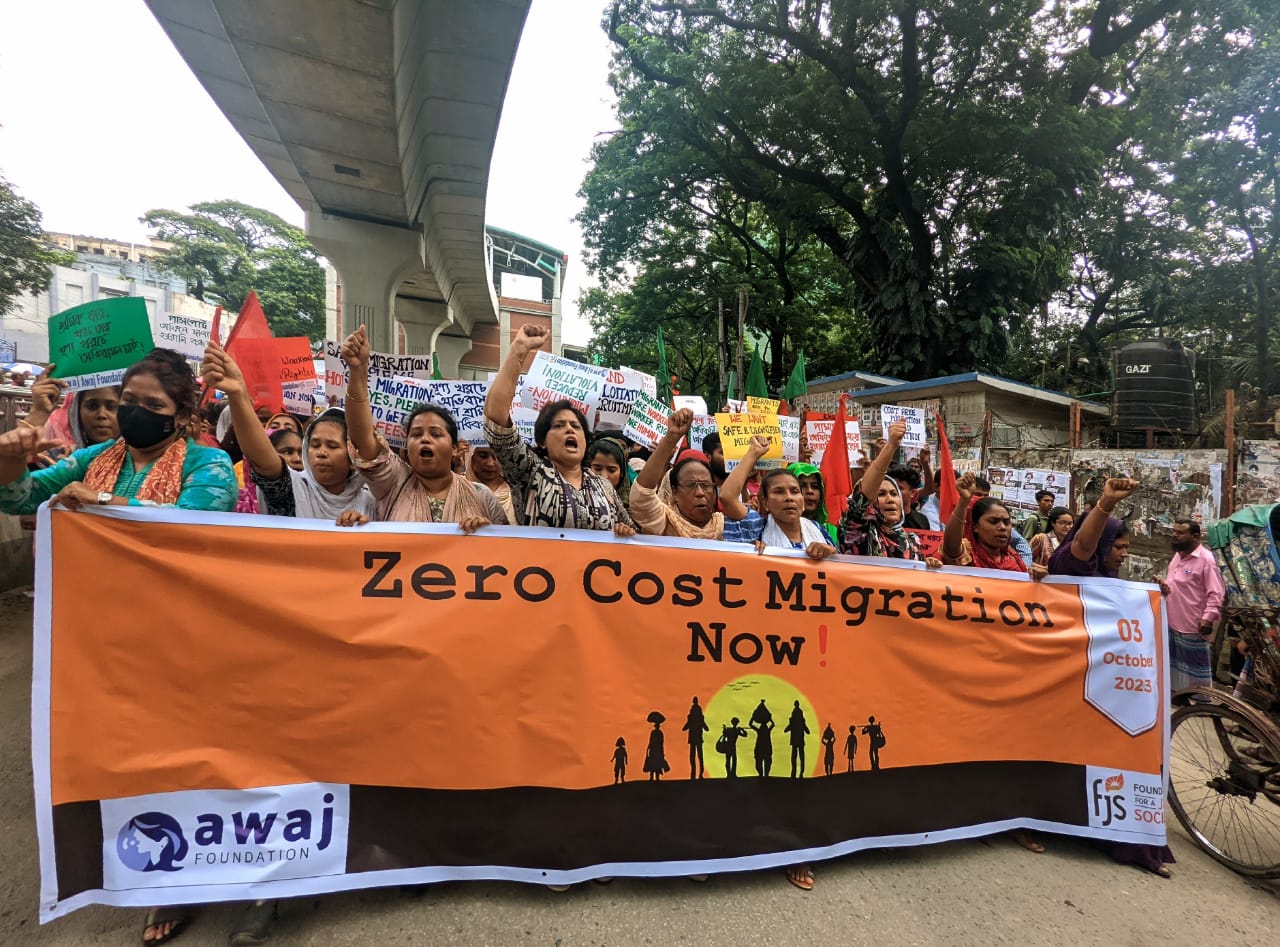''We try to empower women by building their capacity to raise their own voices and strengthen their bargaining capacity''

Awaj Foundation is a member of GAATW working in the city of Dhaka, Bangladesh. In September 2023, Vivian Cartagena, our Programme Officer Alliance Strengthening interviewed Nazma Akter, Founder and Executive Director of the organisation, to know about the journey, work and approach of the organisation throughout the years.
Vivian: Can you tell me how and why the Awaj Foundation was created?
N: The foundation was founded to support workers in the garment industry. I started working in the garment industry when I was 11 years old with my mother. And I remember the time I was working in the factory, it was not considered as a formal sector, with fair wages and with hourly schedules. The salary was very low, and we were treated very badly. Then, I lost my job when we started raising our voices about workers' concerns and issues.
Later on, we joined the labour movement, which was highly male-dominated, and there was little attention given to female workers' issues. There were many challenges, and our concerns were taking time to be addressed as most efforts were focused on political interest rather than on workers. We observed that many things were going badly, so as formal garment workers, we created this foundation. Seeing all the challenges and difficulties that workers face in this sector, we felt the need to organise among workers.
I keep looking back at my younger years when I raised my voice at that factory, and in the community, but our issues and demands were not heard instead, we were beaten by the police, blacklisted, and couldn't get a job. This is the reason why we are independent, and we want to lead all workers to raise their voices. That’s how I established this foundation in 2003.

Vivian: Could you tell us more about these challenging issues that you are focusing on? You have mentioned issues such as low wages in the garment sector, the exclusion of women, and even the disrespect of their rights, among others. Among these, which one is most challenging for you and for the foundation?
N: I think the major challenge is the normalisation of patriarchal behaviours in society. When a woman raises her voice on a particular issue, she can face difficulties from society. Currently, we are fighting for freedom of association and collective bargaining, gender-based violence, access to living wages, climate justice, and climate change. These are our main program areas and the issues we are fighting against. We are also raising the issue of the global supply chain, accountability, and transparency because most of the companies in Bangladesh benefit from internal migration and external migration.
We observed similar problems for garment workers in Gulf countries and other developing countries. They face the same issues, and some end up exploited. Migrant workers in low-wage sectors are more exposed to exploitative conditions and hazardous work. In the case of domestic workers, they come to face all kinds of harassment and abuse, such as sexual, physical, and mental.
So, relating to these issues, we try to empower women by building their capacity to raise their own voices and strengthen their bargaining capacity.
Vivian: Great, and what are the main dynamics in the work that you do with women? For example, how do you conduct the training sessions for empowering and bargaining skills?
N: We have formal and informal training, and we also provide human rights training. We do that with responsibility. We focus on responsible leadership of women, for example, in terms of rights and obligations. So, we have women who are very positive and can successfully handle and resolve issues at the workplace. We also try to make them understand and engage with local and international organisations. They attend meetings, participate, and raise their own voice. Also, we have established a women’s network, and among them, they work on how to demand their rights and raise their voices.
Vivian: And how do you incorporate women's voices into your work? For example, the inputs that you get from these meetings and forums, how are they incorporated?
N: Women often raise their voices with different stakeholders, and they also do campaigns for policy advocacy. Some of the workers are part of the executive board members and often take up lead positions when they have union-level leadership meetings or associations.

When a worker comes to our office or to our field office, we also ask them to bring more workers, that’s how our network increases. Most workers come with low education; however, they come with determination and dedication to work, so we think this is their power that can be strengthened further. We have to consider that this is also hard for them because they usually wake up early in the morning and finish late at night, they need to do the chores as well. But they are giving time and participating in our activities.
In Bangladesh, the living cost is really high, and they may not even have sufficient food. Every issue is a problem, but they are very resilient, and when we do something such as recreation, training, and activities, we try to target some tasks. We reunite women with other work sectors, in general.
Vivian: And what would you say are the biggest challenges, not only in terms of the rights of workers but in migration and possible cases of labour exploitation?
N: Well, the challenge is the legislation, because there are different declarations, like the Colombo Process, and the Abu Dhabi Declaration, but there are no bilateral agreements. We have agreements with some countries, but it is not legally binding for cases of labour rights violations and in terms of legal actions. Also, there’s a lack of ratification of ILO conventions for the workers, and it has not been ratified or implemented. So, if they are working in the domestic sector or in any other informal work, they typically don’t have the right to organise. There are no human rights or union organisations.
When they are working in different areas, they are also cheated and told that they’ll be paid $5 per day, but later, they only give them $2 or $3. Migrant workers can be easily exploited if their contract is not followed by their employers. Also, when there is an amendment of certain laws on labour rights, it usually favours the companies and not the workers. Most of the people who are doing business in my country come from the USA, Canada, Australia, Europe, and some rich countries such as Japan, China.
Also, there are broader challenges such as individualisation, capitalism, fundamentalism, patriarchy, so many things.
Vivian: For my final question, what does it mean for Awaj Foundation to be part of an alliance such as GAATW?

N: We became a member of GAATW just recently because of our work on Anti-Trafficking, women’s rights, and workers’ rights. Years ago, we attended a GAATW program, and we found it very interesting, we had a lot of interaction with different human rights organisations. So we were very intererested on GAATW because our work is not only capacity building, but we also wanted to build networks locally and internationally. We think that it is the strength that GAATW has.
Actually, we recently started a small collaboration together, through the Women Workers Forum program, and we find it very interesting. I hope that we continue the collaboration because we all want to create and demand better conditions for women migrant workers.
Vivian: Thank you for your time, Nazma. It was wonderful talking to you and getting to know more about the Awaj Foundation.

